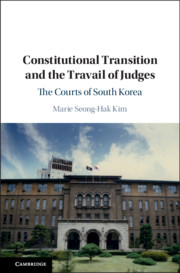Book contents
- Constitutional Transition and the Travail of Judges
- Constitutional Transition and the Travail of Judges
- Copyright page
- Dedication
- Contents
- Figures
- Tables
- Preface
- 1 Introduction
- 2 The Making of the Constitution and the Courts, 1945–1962
- 3 Jurisprudential Evolution, 1962–1972
- 4 The Yusin Era, 1972–1980 (1): The Laws
- 5 The Yusin Era, 1972–1980 (2): The Courts
- 6 The Yusin Era, 1972–1980 (3): The Judges
- 7 Political Transitions and Rule of Law, 1980–1987
- 8 Democracy and Travails of Judges, 1987 to the Present
- 9 Conclusion
- Bibliography
- Index
1 - Introduction
Published online by Cambridge University Press: 23 July 2019
- Constitutional Transition and the Travail of Judges
- Constitutional Transition and the Travail of Judges
- Copyright page
- Dedication
- Contents
- Figures
- Tables
- Preface
- 1 Introduction
- 2 The Making of the Constitution and the Courts, 1945–1962
- 3 Jurisprudential Evolution, 1962–1972
- 4 The Yusin Era, 1972–1980 (1): The Laws
- 5 The Yusin Era, 1972–1980 (2): The Courts
- 6 The Yusin Era, 1972–1980 (3): The Judges
- 7 Political Transitions and Rule of Law, 1980–1987
- 8 Democracy and Travails of Judges, 1987 to the Present
- 9 Conclusion
- Bibliography
- Index
Summary
This chapter introduces the main themes and arguments of the book. Each of the nine chapters provides a historical account of the courts that were entrusted with the dual duties of implementing the laws and promoting justice at a time of particular challenges of constitutional transition. An open, evolutionary interpretation of the judiciary, cutting through the country’s constitutional and political thickets, illumines the way Korea addresses the relationship between legality and substantive justice.
Keywords
- Type
- Chapter
- Information
- Constitutional Transition and the Travail of JudgesThe Courts of South Korea, pp. 1 - 17Publisher: Cambridge University PressPrint publication year: 2019

